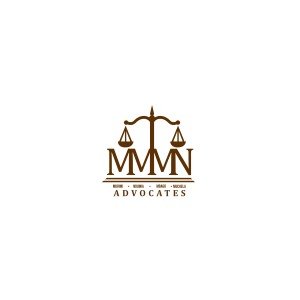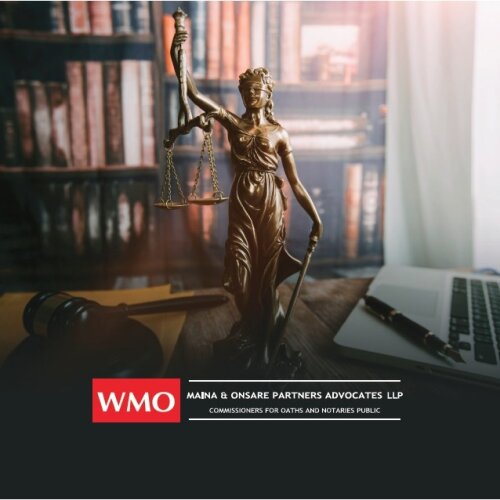Best Creditor Lawyers in Kenya
Share your needs with us, get contacted by law firms.
Free. Takes 2 min.
Or refine your search by selecting a city:
List of the best lawyers in Kenya
Legal guides written by Adroit Law LLP:
- Kenya Launches Digital Nomad Visa: A Gateway for Remote Workers
- Navigating the Payment System License Maze in Kenya
- Navigating the Complexities of Mining Licenses and Permits in Kenya: A Look into Artisanal and Large-Scale Operations
About Creditor Law in Kenya
Creditor law in Kenya involves the legal principles governing the relationship between creditors and debtors. It encompasses various aspects such as the creation of debt, rights of creditors, the obligations of debtors, and the enforcement of debt recovery. The legal framework is largely influenced by statutes, common law, and judicial precedents. Key legislation includes the Insolvency Act, the Contracts Act, and the Land Act, among others. Creditor law aims to ensure fair debt recovery while protecting the rights of debtors.
Why You May Need a Lawyer
There are numerous situations where individuals or businesses may require legal assistance in creditor-related matters. Such scenarios include:
- Assisting in drafting or reviewing loan agreements to ensure they meet legal standards.
- Advising on debt collection strategies and legal recourse available against defaulting debtors.
- Representing creditors in court for debt recovery proceedings.
- Navigating complex insolvency and bankruptcy cases.
- Providing guidance on restructuring financially distressed businesses.
- Protecting assets from unfair creditor claims through legal defense mechanisms.
Local Laws Overview
The legal framework for creditor law in Kenya entails the following key aspects:
- The Insolvency Act, which addresses bankruptcy issues, including the reorganization and liquidation of insolvent entities.
- The Credit Reference Bureau Regulations, which govern the sharing of credit information and the operations of credit reference bureaus.
- The Land Act and the Land Registration Act, which can be relevant in cases where land is used as security for a debt.
- The Contracts Act, which outlines principles related to the formation of contracts, including loan agreements.
- The Fair Administrative Action Act, which ensures public bodies act lawfully when forfeiting or managing debt-related cases.
Frequently Asked Questions
What constitutes a legal debt in Kenya?
A legal debt in Kenya typically arises from a contract or agreement where one party agrees to repay money borrowed from another party.
How can a creditor recover a debt in Kenya?
A creditor can recover a debt through legal proceedings in Kenyan courts, which may involve filing a suit for recovery or initiating insolvency proceedings.
What happens if a debtor is declared bankrupt?
If declared bankrupt, a debtor's assets may be managed by a trustee to pay creditors' claims as per the Insolvency Act.
Are there time limits for debt recovery in Kenya?
Yes, creditors generally have six years from the date the debt became due to initiate legal recovery proceedings, per the Limitations of Actions Act.
Can a creditor enforce a foreign judgment in Kenya?
Yes, foreign judgments can be enforced in Kenya, subject to the provisions of the Foreign Judgments (Reciprocal Enforcement) Act.
What rights do debtors have in Kenya?
Debtors have rights such as protection against harassment, receiving fair treatment under the Fair Administrative Action Act, and access to accurate credit information.
Can creditors access a debtor's credit information?
Yes, creditors can access a debtor's credit information through credit reference bureaus, which must be shared with the debtor's consent.
What is a voluntary arrangement in insolvency situations?
A voluntary arrangement is an agreement between an insolvent debtor and their creditors to repay debts over time without going to full bankruptcy.
Can secured creditors claim their security before other creditors?
Yes, secured creditors usually have priority in claiming their security interests over other types of creditors in the event of debtor insolvency.
How can creditors protect themselves from debtor insolvency?
Creditors can protect themselves by securing debts, conducting thorough credit checks, and including protective clauses in loan agreements.
Additional Resources
There are several resources and organizations in Kenya that can assist in creditor-related legal matters, including:
- The Kenya Law Society for finding qualified legal professionals.
- The Kenya Insolvency Restructuring and Turnaround Association (KIRTA) for insolvency issues.
- The Central Bank of Kenya, which regulates credit information through credit reference bureaus.
- The Financial Sector Regulators Forum, which can provide information on regulatory aspects impacting creditors.
Next Steps
If you need legal assistance in creditor-related matters:
- Consult with a qualified creditor lawyer via the Kenya Law Society for tailored legal advice.
- Gather all relevant documentation, including loan agreements and payment records, before any consultation.
- Consider mediation or arbitration as interim steps to settle disputes outside of court.
- Stay informed about the latest creditor law amendments and how they might affect your case.
- Contact credit reference bureaus to verify and manage your credit information.
Lawzana helps you find the best lawyers and law firms in Kenya through a curated and pre-screened list of qualified legal professionals. Our platform offers rankings and detailed profiles of attorneys and law firms, allowing you to compare based on practice areas, including Creditor, experience, and client feedback.
Each profile includes a description of the firm's areas of practice, client reviews, team members and partners, year of establishment, spoken languages, office locations, contact information, social media presence, and any published articles or resources. Most firms on our platform speak English and are experienced in both local and international legal matters.
Get a quote from top-rated law firms in Kenya — quickly, securely, and without unnecessary hassle.
Disclaimer:
The information provided on this page is for general informational purposes only and does not constitute legal advice. While we strive to ensure the accuracy and relevance of the content, legal information may change over time, and interpretations of the law can vary. You should always consult with a qualified legal professional for advice specific to your situation.
We disclaim all liability for actions taken or not taken based on the content of this page. If you believe any information is incorrect or outdated, please contact us, and we will review and update it where appropriate.
Browse creditor law firms by city in Kenya
Refine your search by selecting a city.

















